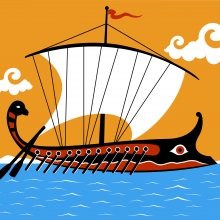Learning the language of cells
Introducing Dr. Yaron Antebi
New scientists

While studying physics at the Weizmann Institute, Dr. Yaron Antebi became captivated by exciting developments in biology. Radically changing course towards the end of his graduate work, he began to apply the strengths he developed in understanding string theory and physics to the challenges of deciphering how cells communicate with each other.
Just as humans use letters to create messages, cells release molecules called ligands into the environment to send information to their neighbors. These ligands bind to receptors on the surface of other cells, which interpret the messages and trigger the appropriate response. Under traditional models of cellular communications, each ligand was thought to serve as key to opening a specific receptor lock.
But scientists realized that it is not that simple. In fact, it is a bit of mayhem: all of the different ligands appear to interact with all the different receptors. In this way, communication between cells is like a conversation in a crowded room with everyone talking at once. This seems to contradict the possibility of individual cells to properly interpret and respond to specific signals.
After studying as an undergraduate for a year at MIT, Dr. Antebi completed a BSc in physics and mathematics magna cum laude at Tel Aviv University in 1998. During his PhD studies in high-energy theoretical physics at the Weizmann Institute with Profs. Ofer Aharony and Micha Berkooz in the Department of Particle Physics and Astrophysics, he was drawn to the study of string theory and supersymmetrty. After completing his PhD in 2008, it was then, as a postdoctoral fellow in Prof. Nir Friedman’s lab in the Department of Immunology, that he began learning the basic tools of immunology research in order to try to understand how conflicting signals are processed by the body’s T-cells. During this time, he also collaborated with Prof. Uri Alon of the Department of Molecular Cell Biology, where he contributed new insights into the study of the control circuits governing cell population levels.
It was clear to him by this point that his focus would be tackling the complexity of intercellular communications.
Continuing his postdoc research at the California Institute of Technology (Caltech) in biology and biological engineering, his research eventually led him to the surprising conclusion that cells aren't “listening” to individual ligands—but rather to combinations of ligands. That understanding has given rise to a radical new paradigm for understanding how cells talk with each other. Digging deeper, he fused all of his areas of expertise, combining experimental biology with the mathematical modeling learned in his physics training.
He has succeeded in showing something incredibly insightful: that cells respond to complex combinations of different ligands, not just a single message, and also that different cell types can interpret in different ways the same set of signals. This view is a radical departure from the conventional understanding of how cells communicate with each other—and provide a new foundation for understanding how information is communicated inherently through combinations of signaling molecules and their receptors. This is the avenue he plans to pursue in his new lab at the Weizmann Institute.
Bio
After studying for a year at MIT in 1995-1996, Dr. Yaron Antebi completed a BSc in physics and mathematics magna cum laude at Tel Aviv University in 1998. He completed a PhD in theoretical high-energy physics at the Weizmann Institute under Profs. Ofer Aharony and Micha Berkooz in the Department of Particle Physics and Astrophysics in 2008. Dr. Antebi then spent two years studying biology as a postdoctoral fellow in Prof. Nir Friedman’s lab in the Department of Immunology. From 2010 until joining the Institute’s Department of Molecular Genetics in 2018, Dr. Antebi conducted research as a postdoctoral fellow in biology and biological engineering at the California Institute of Technology.
Dr. Antebi is a frequently invited speaker at conferences on everything from string theory, to gene circuit design, to systems biology and immunology. His awards and honors include a physics department prize at Tel Aviv University in 1996, an Amos de Shalit Foundation Scholarship in 1997, and the BSc Award of Excellenc at Tel Aviv University in 1998.
Dr. Yaron Antebi is supported by the estate of David Levinson, the Jeanne and Joseph Nissim Center for Life Sciences Research, the estate of Bella Ockman, the David M. Polen Charitable Trust, the Abraham & Sonia Rochlin Foundation, and the Ruth and Samuel J. Rosenwasser Charitable Fund









